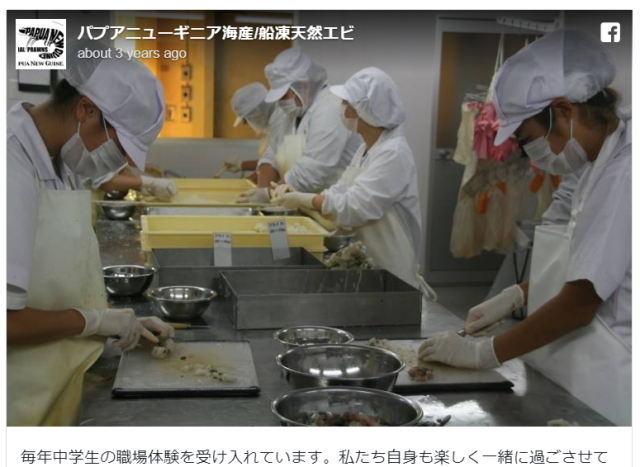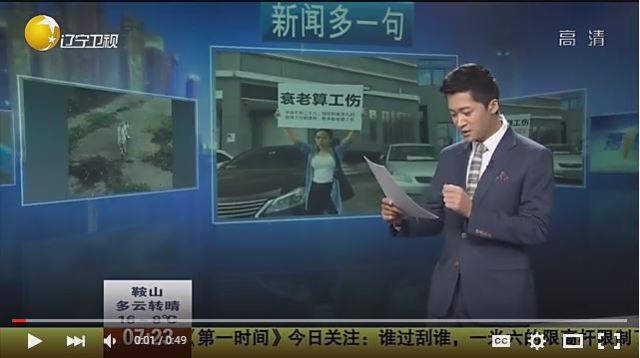Among other grievances, workers allege that they are not paid fairly for their preparation time or labor and hours worked are unjustly rounded down.
labor
Working hours at this shrimp processing and packaging plant are outlined as: “Whenever the heck you feel like it.”
You don’t get many chances to be a part of sports history, and judging by the standards for volunteers set by the The Tokyo Organising Committee of the Olympic and Paralympic Games, this isn’t one either.
After a man turned himself into police for refusing to pay for his meal, some wondered if he might be mentally ill. On the other hand, some suspect he might be saner than many in Japan.
On November 18 a young woman was spotted on the streets of Shenzhen City in Guangdong, China carrying a sign which read: “Overnight and overtime work has made me into an old lady. Both my love and work lives are miserable. I request approval for workers’ compensation.”
It was an unusual yet straightforward demand that triggered debate and reflection on the state of working conditions in the country.
During an interview at his Kyoto headquarters this week, Nidec Corporation CEO Shigenobu Nagamori was quoted as saying, “Due to Japan’s strict labor laws, we cannot compete with enterprises in Korea and China.” He intends to lobby the government to relax labor regulations to allow for more flexible working conditions.
He additionally said that the government and the Bank of Japan need to weaken and maintain the yen to around a 90-100 yen to the dollar exchange rate in order for Japanese export companies to compete with booming exports from China and Korea. Read More
With just one week left to vote for the most evil employer of 2012, we’d like to shed some light on an overlooked “black corporation” – city governments. Sure, government workers often get a bad rap as being slow and overpaid with ridiculous job security. But in the words of Bob Dylan “the times they are a-changing.”
In Osaka, government workers will be forbidden to have any tattoos and a drinking ban is in talks for all the city workers of Fukuoka. But to really see the slippery slope that these labor reforms can lead to, we should turn our attention to the People’s Republic of China.






 Highest Starbucks in Japan set to open this spring in the Tokyo sky
Highest Starbucks in Japan set to open this spring in the Tokyo sky Development of Puyo Puyo puzzle game for use in nursing homes underway
Development of Puyo Puyo puzzle game for use in nursing homes underway Skyscraper sized Pokémon cards to appear in Tokyo all year long in Tocho projection mapping event
Skyscraper sized Pokémon cards to appear in Tokyo all year long in Tocho projection mapping event Japan has only one airport named after a samurai, so let’s check out Kochi Ryoma【Photos】
Japan has only one airport named after a samurai, so let’s check out Kochi Ryoma【Photos】 Burning through cash just to throw things away tops list of headaches when moving house in Japan
Burning through cash just to throw things away tops list of headaches when moving house in Japan Boro the Caterpillar anime now showing at the Ghibli Museum in Tokyo 【SoraReview】
Boro the Caterpillar anime now showing at the Ghibli Museum in Tokyo 【SoraReview】 Is Sapporio’s Snow Festival awesome enough to be worth visiting even if you hate the snow? [Pics]
Is Sapporio’s Snow Festival awesome enough to be worth visiting even if you hate the snow? [Pics] We eat 13 of the most highly recommended sushi items at Sushiro and pick the best of the best
We eat 13 of the most highly recommended sushi items at Sushiro and pick the best of the best Sushi restaurant in Tokyo serves up a plate of “old guy” for only 200 yen
Sushi restaurant in Tokyo serves up a plate of “old guy” for only 200 yen Japanese convenience store chain’s new matcha sweets are heaven for green tea lovers
Japanese convenience store chain’s new matcha sweets are heaven for green tea lovers The 10 most annoying things foreign tourists do on Japanese trains, according to locals
The 10 most annoying things foreign tourists do on Japanese trains, according to locals Starbucks Japan releases new sakura goods and drinkware for cherry blossom season 2026
Starbucks Japan releases new sakura goods and drinkware for cherry blossom season 2026 Japan has trams that say “sorry” while they ride around town…but why?
Japan has trams that say “sorry” while they ride around town…but why? Tokyo Skytree turns pink for the cherry blossom season
Tokyo Skytree turns pink for the cherry blossom season Japan’s new “Cunte” contact lenses aren’t pronounced like you’re probably thinking they are
Japan’s new “Cunte” contact lenses aren’t pronounced like you’re probably thinking they are Shibuya Station’s Hachiko Gate and Yamanote Line stairway locations change next month
Shibuya Station’s Hachiko Gate and Yamanote Line stairway locations change next month Yakuzen ramen restaurant in Tokyo is very different to a yakuza ramen restaurant
Yakuzen ramen restaurant in Tokyo is very different to a yakuza ramen restaurant Starbucks Japan adds new sakura Frappuccino and cherry blossom drinks to the menu
Starbucks Japan adds new sakura Frappuccino and cherry blossom drinks to the menu Japan’s newest Shinkansen has no seats…or passengers [Video]
Japan’s newest Shinkansen has no seats…or passengers [Video] Foreigners accounting for over 80 percent of off-course skiers needing rescue in Japan’s Hokkaido
Foreigners accounting for over 80 percent of off-course skiers needing rescue in Japan’s Hokkaido Super-salty pizza sends six kids to the hospital in Japan, linguistics blamed
Super-salty pizza sends six kids to the hospital in Japan, linguistics blamed Starbucks Japan unveils new sakura Frappuccino for cherry blossom season 2026
Starbucks Japan unveils new sakura Frappuccino for cherry blossom season 2026 Foreign tourists in Japan will get free Shinkansen tickets to promote regional tourism
Foreign tourists in Japan will get free Shinkansen tickets to promote regional tourism Take a trip to Japan’s Dododo Land, the most irritating place on Earth
Take a trip to Japan’s Dododo Land, the most irritating place on Earth Naruto and Converse team up for new line of shinobi sneakers[Photos]
Naruto and Converse team up for new line of shinobi sneakers[Photos] Is China’s don’t-go-to-Japan warning affecting the lines at a popular Tokyo gyukatsu restaurant?
Is China’s don’t-go-to-Japan warning affecting the lines at a popular Tokyo gyukatsu restaurant? Survey asks foreign tourists what bothered them in Japan, more than half gave same answer
Survey asks foreign tourists what bothered them in Japan, more than half gave same answer Japan’s human washing machines will go on sale to general public, demos to be held in Tokyo
Japan’s human washing machines will go on sale to general public, demos to be held in Tokyo Starbucks Japan releases new drinkware and goods for Valentine’s Day
Starbucks Japan releases new drinkware and goods for Valentine’s Day We deeply regret going into this tunnel on our walk in the mountains of Japan
We deeply regret going into this tunnel on our walk in the mountains of Japan Studio Ghibli releases Kodama forest spirits from Princess Mononoke to light up your home
Studio Ghibli releases Kodama forest spirits from Princess Mononoke to light up your home Major Japanese hotel chain says reservations via overseas booking sites may not be valid
Major Japanese hotel chain says reservations via overseas booking sites may not be valid Put sesame oil in your coffee? Japanese maker says it’s the best way to start your day【Taste test】
Put sesame oil in your coffee? Japanese maker says it’s the best way to start your day【Taste test】 No more using real katana for tourism activities, Japan’s National Police Agency says
No more using real katana for tourism activities, Japan’s National Police Agency says Boro the Caterpillar anime now showing at the Ghibli Museum in Tokyo 【SoraReview】
Boro the Caterpillar anime now showing at the Ghibli Museum in Tokyo 【SoraReview】 Is Sapporio’s Snow Festival awesome enough to be worth visiting even if you hate the snow? [Pics]
Is Sapporio’s Snow Festival awesome enough to be worth visiting even if you hate the snow? [Pics] We eat 13 of the most highly recommended sushi items at Sushiro and pick the best of the best
We eat 13 of the most highly recommended sushi items at Sushiro and pick the best of the best Sushi restaurant in Tokyo serves up a plate of “old guy” for only 200 yen
Sushi restaurant in Tokyo serves up a plate of “old guy” for only 200 yen Japanese convenience store chain’s new matcha sweets are heaven for green tea lovers
Japanese convenience store chain’s new matcha sweets are heaven for green tea lovers New Yukimi Daifuku mochi ice cream flavour is inspired by…Ogura Toast?
New Yukimi Daifuku mochi ice cream flavour is inspired by…Ogura Toast? Yakuzen ramen restaurant in Tokyo is very different to a yakuza ramen restaurant
Yakuzen ramen restaurant in Tokyo is very different to a yakuza ramen restaurant Poop is in full bloom at the Unko Museums for cherry blossom season
Poop is in full bloom at the Unko Museums for cherry blossom season Cancelled your trip to Tokyo? Free papercraft download lets you build Akihabara in your own home
Cancelled your trip to Tokyo? Free papercraft download lets you build Akihabara in your own home Osaka establishes first designated smoking area in Dotonbori canal district to fight “overtourism”
Osaka establishes first designated smoking area in Dotonbori canal district to fight “overtourism” Extreme Sashimi: Frog Edition
Extreme Sashimi: Frog Edition 566 million yen in gold bars donated to Japanese city’s water bureau
566 million yen in gold bars donated to Japanese city’s water bureau One-handed pizza from Domino’s Japan is the ultimate convenience
One-handed pizza from Domino’s Japan is the ultimate convenience The U.K. thinks Japanese curry is katsu curry, and people aren’t happy about it
The U.K. thinks Japanese curry is katsu curry, and people aren’t happy about it